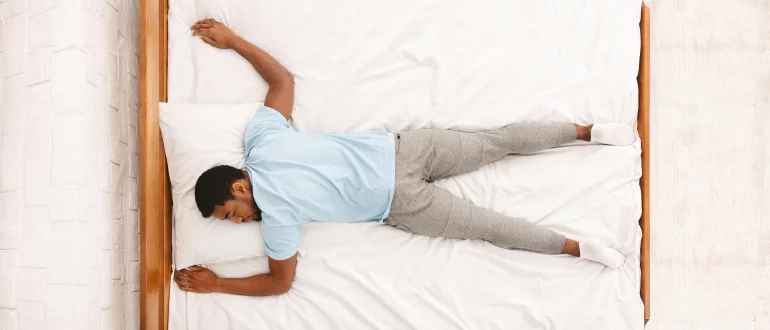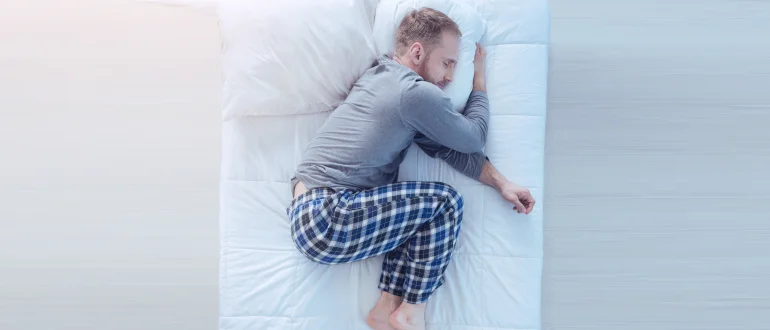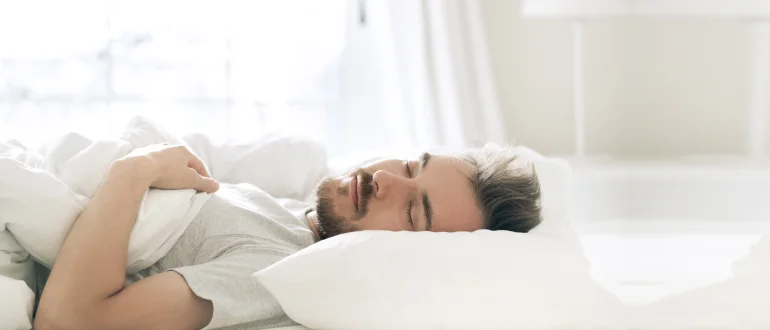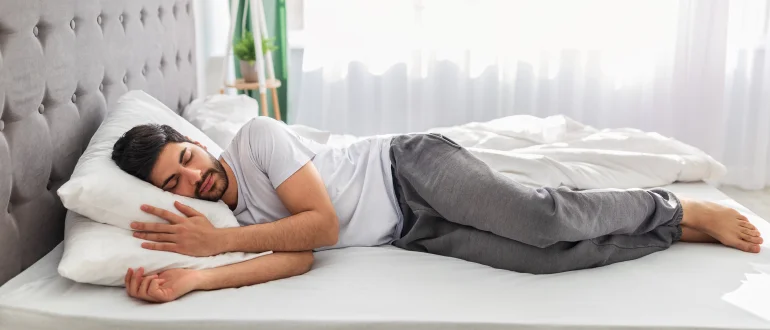Subscribe to get weekly insights
Always stay up to date with our newest articles sent direct to your inbox
Published on 16 Aug, 2023
Updated on 27 Oct, 2023
1136 Views
3 min Read

Written by Care Health Insurance
0Like
Be the First to Like
Did you know your sleeping position greatly affects your physical and mental health? Yes, you read it right; if you are asleep, that doesn’t mean your body is at rest. The body starts to repair and restore while you are sleeping, and it all depends on the position you are sleeping on. However, your sleeping position could disturb bodily functions or help you with healthy and sound sleep. People experience stiff and sore body in the morning due to inappropriate sleeping positions.
If you experience a problem while sleeping, you should know your body position needs to be changed. However, various positions are known to be the best sleeping positions, for it helps you have undisturbed sleep.
In this article, we shed light on sleeping positions that are either appropriate or inappropriate for you. Read on to know if your sleep position is helpful to you or not.
Sleeping in a position that helps your body be comfortable is wise and essential for your overall health. A good sleeping position helps relieve stress on the spine and neck, while an inappropriate position can worsen the pain and stiffness in the arms, back, shoulders and back along with poor quality sleep. One may also feel sleep deprived if they are in a position that is right for them.
Below are the sleeping positions that you may or may not sleep in. Check if the position you sleep in is suitable for you or not-

You are not alone if you like to sleep in a prone position. According to a survey, about 7% of people find sleeping on their stomachs comfortable. Although it helps reduce snoring, this position is not recommended at all.
When you sleep in this position, your head gets raised on the pillow, making it difficult for your spine to be neutral. It also strains your neck and back as the heaviest part of your body, the middle body, makes a spine overarch. Over time, you may experience pain and nerve issues leading to a tingling sensation or extreme numbness. Furthermore, if you turn your head is turned to one side while sleeping on your stomach, there will be a reduction in the size of the airway and limited blood circulation.
However, if you find it challenging to change your sleeping position, try modifying it. You can keep your neck straight and put your forehead down on the edge of your pillow. This way, your spine will be more neutral while giving you enough room for breathing. You can also use a pillow to elevate the pelvis to alleviate the pressure on your lower back.

Although it feels like a comfortable side position, it is not advisable. The curvature this position forms in the spine can cause discomfort and strain in the entire body, especially in the back and neck, if you are tightly curled while sleeping, as it limits space for the diaphragm, which results in restricted breathing.

The second most common position, the supine position, is relatively comfortable compared to the abovementioned positions. Sleeping with the back flat on your bed enables your spine to be in a natural position. This saves you from perpetual backaches, pain in the neck and shoulders.
However, sleeping on the back isn’t ideal as it exacerbates sleep apnea and snoring. When you sleep on the back, your soft tissues in the throat and tongue relax and get pulled down in the airway due to gravity, and that’s when snoring begins. You can also modify the position by adding a cervical cushion or pillow to support the neck and the knees by placing another pillow under them. This practice will improve your sleep quality and decrease your lower back pain and strain.

This is the most common sleeping position for a good reason—it is the most comfortable sleeping position. Health and sleep experts recommend sleeping in the side position for its many advantages. While lying on your side, the spine can stay long and somewhat neutral with the correct mattress. This lessens unnecessary shoulder, back, and neck pain. Hence this position makes the best sleeping position for back pain.
If you sleep in a position that brings discomfort and feel sleep deprived, you may face other health issues. Sleep deprivation has long-term and detrimental health conditions such as high risk of heart attack, hypertension, depression, stroke, diabetes and obesity. These health conditions can cause a dent in finances due to the ever-rising cost of medical treatment and hospitalisation. If you want to steer clear of the stress of arranging finances last minute due to medical contingency, get yourself a health insurance policy from Care Health Insurance that ensures to be by your side when a medical emergency strikes. So, delay no more to safeguard yourself and your finances right away!
>> Also Read: Reasons to Have 8 Hours of Sleep Daily At Night
Disclaimer: Disclaimer: The above information is for reference purposes only. The health insurance benefits are subject to policy terms and conditions.
Be the First to Like
शुगर कंट्रोल कैसे करे? जानें, डायबिटीज में क्या खाना चाहिए Care Health Insurance in Health & Wellness
Thyroid : मामूली नहीं हैं महिलाओं में थायराइड होना, जानें इसके लक्षण और घरेलू उपचार Care Health Insurance in Diseases
हाई ब्लड प्रेशर को तुरंत कंट्रोल कैसे करें? देखें इसके उपाय Care Health Insurance in Diseases
प्लेटलेट्स की कमी के लक्षण, कारण और इलाज क्या है Care Health Insurance in Diseases
प्रेगनेंसी ब्लड टेस्ट कब करना चाहिए? देखें, प्रेगनेंसी ब्लड टेस्ट नाम Care Health Insurance in Maternity
काली मिर्च के फायदे और नुकसान क्या है? Care Health Insurance in Health & Wellness
World Bipolar Day 2025: Understanding Bipolar Disorder and Breaking Stigma Care Health Insurance in Health Insurance Articles
9 Saffron Health Benefits You Shouldn’t Miss Care Health Insurance in Diet & Nutrition